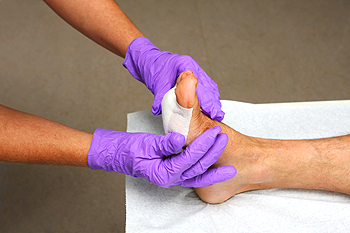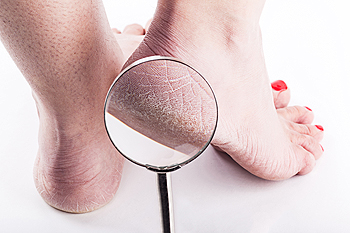Manalapan
(732) 845-0100
Manalapan (732) 845-0100
 If you are afflicted with diabetes, you may have foot conditions that have developed as a result of this ailment. The body’s ability to heal any sores, cuts, or wounds that form on the feet may diminish when diabetes is present. Additionally, many diabetic patients experience a form of neuropathy, which reduces the ability to feel sensations in the feet. This may block the feeling of any pain that may be present from open wounds, and is often accompanied by a sensation of tingling or “pins and needles”. Research has shown there are several ways to control this condition, including monitoring blood pressure and cholesterol levels, implementing healthy lifestyle changes, and incorporating a gentle exercise routine into your daily activities. If you are diabetic, it is strongly suggested to consult with a podiatrist on a regular basis for proper examinations of your feet, in addition to monitoring any open wounds, which may aid in preventing infections from occurring.
If you are afflicted with diabetes, you may have foot conditions that have developed as a result of this ailment. The body’s ability to heal any sores, cuts, or wounds that form on the feet may diminish when diabetes is present. Additionally, many diabetic patients experience a form of neuropathy, which reduces the ability to feel sensations in the feet. This may block the feeling of any pain that may be present from open wounds, and is often accompanied by a sensation of tingling or “pins and needles”. Research has shown there are several ways to control this condition, including monitoring blood pressure and cholesterol levels, implementing healthy lifestyle changes, and incorporating a gentle exercise routine into your daily activities. If you are diabetic, it is strongly suggested to consult with a podiatrist on a regular basis for proper examinations of your feet, in addition to monitoring any open wounds, which may aid in preventing infections from occurring.
Diabetic foot care is important in preventing foot ailments such as ulcers. If you are suffering from diabetes or have any other concerns about your feet, contact Dr. Charles Marchese from Manalapan Foot & Ankle. Our doctor can provide the care you need to keep you pain-free and on your feet.
Diabetic Foot Care
Diabetes affects millions of people every year. The condition can damage blood vessels in many parts of the body, especially the feet. Because of this, taking care of your feet is essential if you have diabetes, and having a podiatrist help monitor your foot health is highly recommended.
The Importance of Caring for Your Feet
Patients with diabetes should have their doctor monitor their blood levels, as blood sugar levels play such a huge role in diabetic care. Monitoring these levels on a regular basis is highly advised.
It is always best to inform your healthcare professional of any concerns you may have regarding your feet, especially for diabetic patients. Early treatment and routine foot examinations are keys to maintaining proper health, especially because severe complications can arise if proper treatment is not applied.
If you have any questions please feel free to contact our offices located in Manalapan, NJ, and Staten Island, NY . We offer the newest diagnostic and treatment technologies for all your foot and ankle needs.
Read more about Diabetic Foot Conditions Pregnant women may experience swollen feet and ankles in addition to their growing bellies as a result of their expanding uterus. The excess fluid that causes the ankles to swell acts as a nurturing agent and may collect in the tissues of the body. This may occur due to blood flow that may typically increase because the growing child may often put pressure on the pelvic veins. If you are experiencing swollen feet and ankles, there are several ways that may possibly control this uncomfortable condition. These may include not standing or sitting for extended periods of time, performing gentle exercises and stretches that may aid in improving circulation, wearing shoes that are comfortable and fit correctly, in addition to drinking plenty of fresh water on a daily basis. Research has shown the feet may become larger during pregnancy, and it may be beneficial to wear the correct shoe size. It’s suggested to speak with a podiatrist if you have questions about how pregnancy can affect your feet.
Pregnant women may experience swollen feet and ankles in addition to their growing bellies as a result of their expanding uterus. The excess fluid that causes the ankles to swell acts as a nurturing agent and may collect in the tissues of the body. This may occur due to blood flow that may typically increase because the growing child may often put pressure on the pelvic veins. If you are experiencing swollen feet and ankles, there are several ways that may possibly control this uncomfortable condition. These may include not standing or sitting for extended periods of time, performing gentle exercises and stretches that may aid in improving circulation, wearing shoes that are comfortable and fit correctly, in addition to drinking plenty of fresh water on a daily basis. Research has shown the feet may become larger during pregnancy, and it may be beneficial to wear the correct shoe size. It’s suggested to speak with a podiatrist if you have questions about how pregnancy can affect your feet.
Pregnant women with swollen feet can be treated with a variety of different methods that are readily available. For more information about other cures for swollen feet during pregnancy, consult with Dr. Charles Marchese from Manalapan Foot & Ankle. Our doctor will attend to all of your foot and ankle needs.
What Foot Problems Can Arise During Pregnancy?
One problem that can occur is overpronation, which occurs when the arch of the foot flattens and tends to roll inward. This can cause pain and discomfort in your heels while you’re walking or even just standing up, trying to support your baby.
Another problem is edema, or swelling in the extremities. This often affects the feet during pregnancy but tends to occur in the later stages.
How Can I Keep My Feet Healthy During Pregnancy?
If you have any questions please feel free to contact our offices located in Manalapan, NJ, and Staten Island, NY . We offer the newest diagnostic and treatment technologies for all your foot and ankle needs.
 The condition that is referred to as cracked heels may go unnoticed during the winter months. This may be a result of paying little attention to the feet as they are enveloped in socks and shoes. As the warm summer months approach, the condition of the skin on the heels may be more obvious, and may often appear to be cracked and dry. This may be a result of the skin becoming thickened on the heel of the foot, and may appear to have a brown or yellowish tinge to it. If this condition is not promptly treated, the cracks on the skin may become deeper. The cracks on the skin would then be referred to as fissures. This may resemble open wounds, and will typically cause walking and running to become difficult to accomplish as a result of the body’s weight the heels must endure. There may be several reasons for cracked heels to occur, including standing for the majority of the day, having medical conditions such as psoriasis or dermatitis, or being excessively overweight. Research has shown there may be a link between hypothyroidism and cracked heels. This may be a result of the glands in the feet not producing adequate sweat, which may possibly lead to the development of cracked heels. If you are afflicted with this condition, please seek the counsel of a podiatrist to learn about correct treatment options.
The condition that is referred to as cracked heels may go unnoticed during the winter months. This may be a result of paying little attention to the feet as they are enveloped in socks and shoes. As the warm summer months approach, the condition of the skin on the heels may be more obvious, and may often appear to be cracked and dry. This may be a result of the skin becoming thickened on the heel of the foot, and may appear to have a brown or yellowish tinge to it. If this condition is not promptly treated, the cracks on the skin may become deeper. The cracks on the skin would then be referred to as fissures. This may resemble open wounds, and will typically cause walking and running to become difficult to accomplish as a result of the body’s weight the heels must endure. There may be several reasons for cracked heels to occur, including standing for the majority of the day, having medical conditions such as psoriasis or dermatitis, or being excessively overweight. Research has shown there may be a link between hypothyroidism and cracked heels. This may be a result of the glands in the feet not producing adequate sweat, which may possibly lead to the development of cracked heels. If you are afflicted with this condition, please seek the counsel of a podiatrist to learn about correct treatment options.
If the skin on your feet starts to crack, you may want to see a podiatrist to find treatment. If you have any concerns, contact Dr. Charles Marchese from Manalapan Foot & Ankle. Our doctor can provide the care you need to keep you pain-free and on your feet.
Cracked Heels
It is important to moisturize your cracked heels in order to prevent pain, bleeding, and infection. The reason cracked heels form is because the skin on the foot is too dry to support the immense pressure placed on them. When the foot expands, the dry skin on the foot begins to split.
Ways to Help Heal Them
Ways to Prevent Cracked Heels
If you are unsure how to proceed in treating cracked heels, seek guidance from a podiatrist. Your doctor will help you with any questions or information you may need.
If you have any questions, please feel free to contact our offices located in Manalapan, NJ, and Staten Island, NY . We offer the newest diagnostic and treatment technologies for all your foot care needs.
 Research shows that children typically begin to walk at approximately twelve months of age. There are many adorable and cute shoes available for purchase, but they may not be ideal for children’s feet. It is strongly recommended that a proper foot measurement is obtained and this will aid in determining the correct shoe size for your child’s feet. There are several qualities to look for when buying shoes. These may include choosing a shoe with a wide area for the toes to move about in, having a sturdy and flexible sole that is easily bent, and shoes that are comprised of breathable materials. Your child may walk better in shoes that fit properly and this may avoid any tripping or falling that may occur. Please speak with a podiatrist to learn about the importance of proper shoe fitting for your child’s feet.
Research shows that children typically begin to walk at approximately twelve months of age. There are many adorable and cute shoes available for purchase, but they may not be ideal for children’s feet. It is strongly recommended that a proper foot measurement is obtained and this will aid in determining the correct shoe size for your child’s feet. There are several qualities to look for when buying shoes. These may include choosing a shoe with a wide area for the toes to move about in, having a sturdy and flexible sole that is easily bent, and shoes that are comprised of breathable materials. Your child may walk better in shoes that fit properly and this may avoid any tripping or falling that may occur. Please speak with a podiatrist to learn about the importance of proper shoe fitting for your child’s feet.
The health of a child’s feet is vital to their overall well-being. If you have any questions regarding foot health, contact Dr. Charles Marchese of Manalapan Foot & Ankle. Our doctor can provide the care you need to keep you pain-free and on your feet.
Tips for Keeping Children's Feet Healthy
If you have any questions, please feel free to contact our offices located in Manalapan, NJ, and Staten Island, NY . We offer the newest diagnostic and treatment technologies for all your foot care needs.
Read more about How to Care for Your Child's Feet